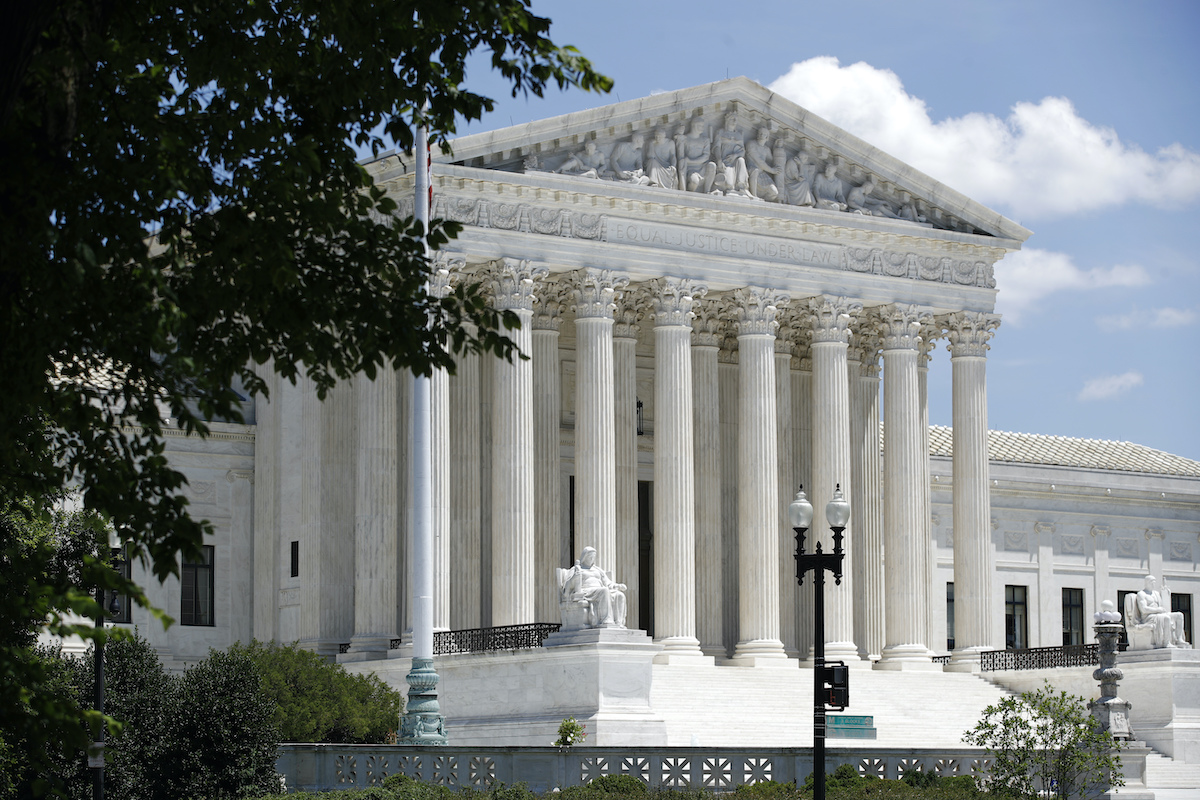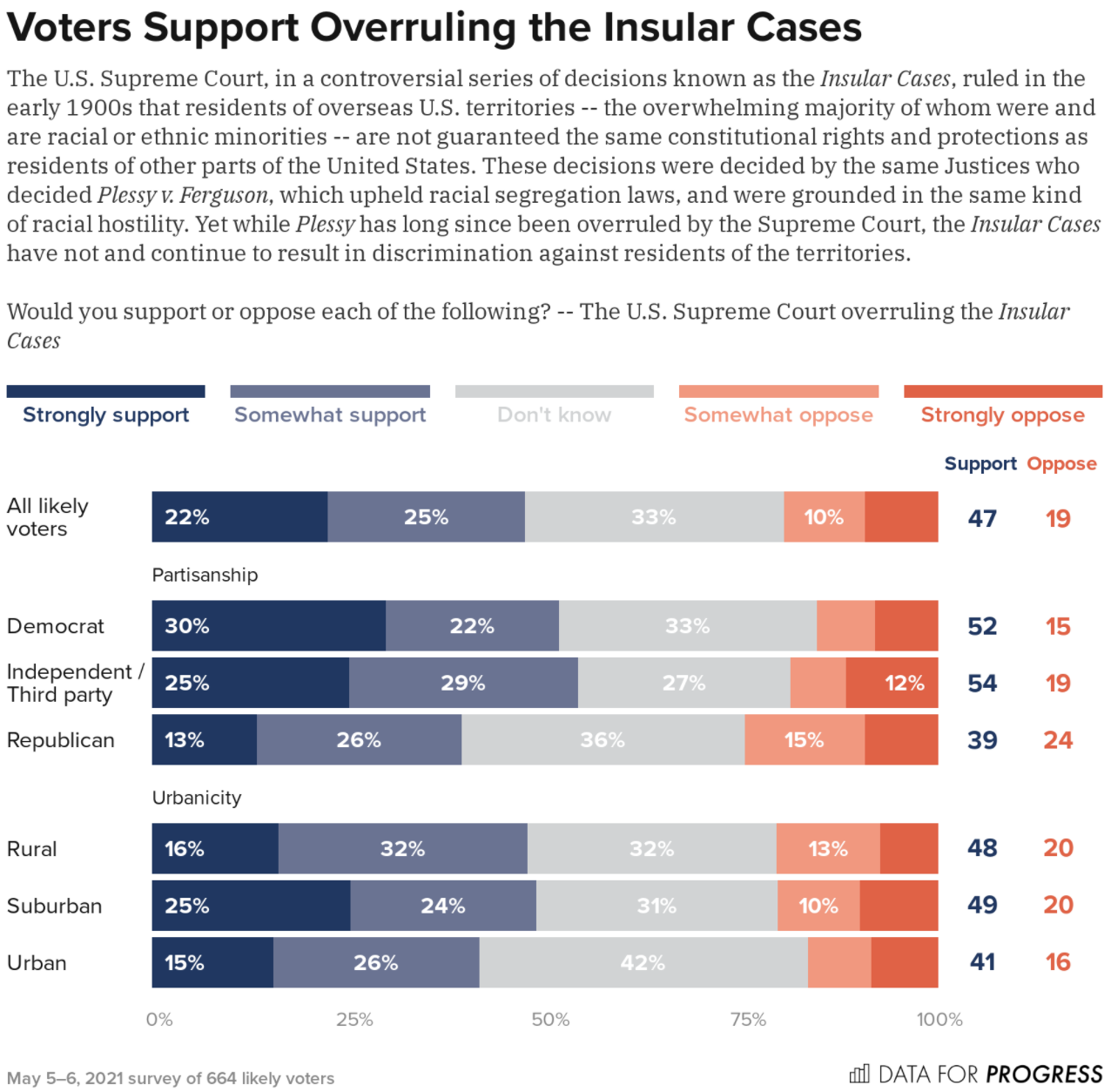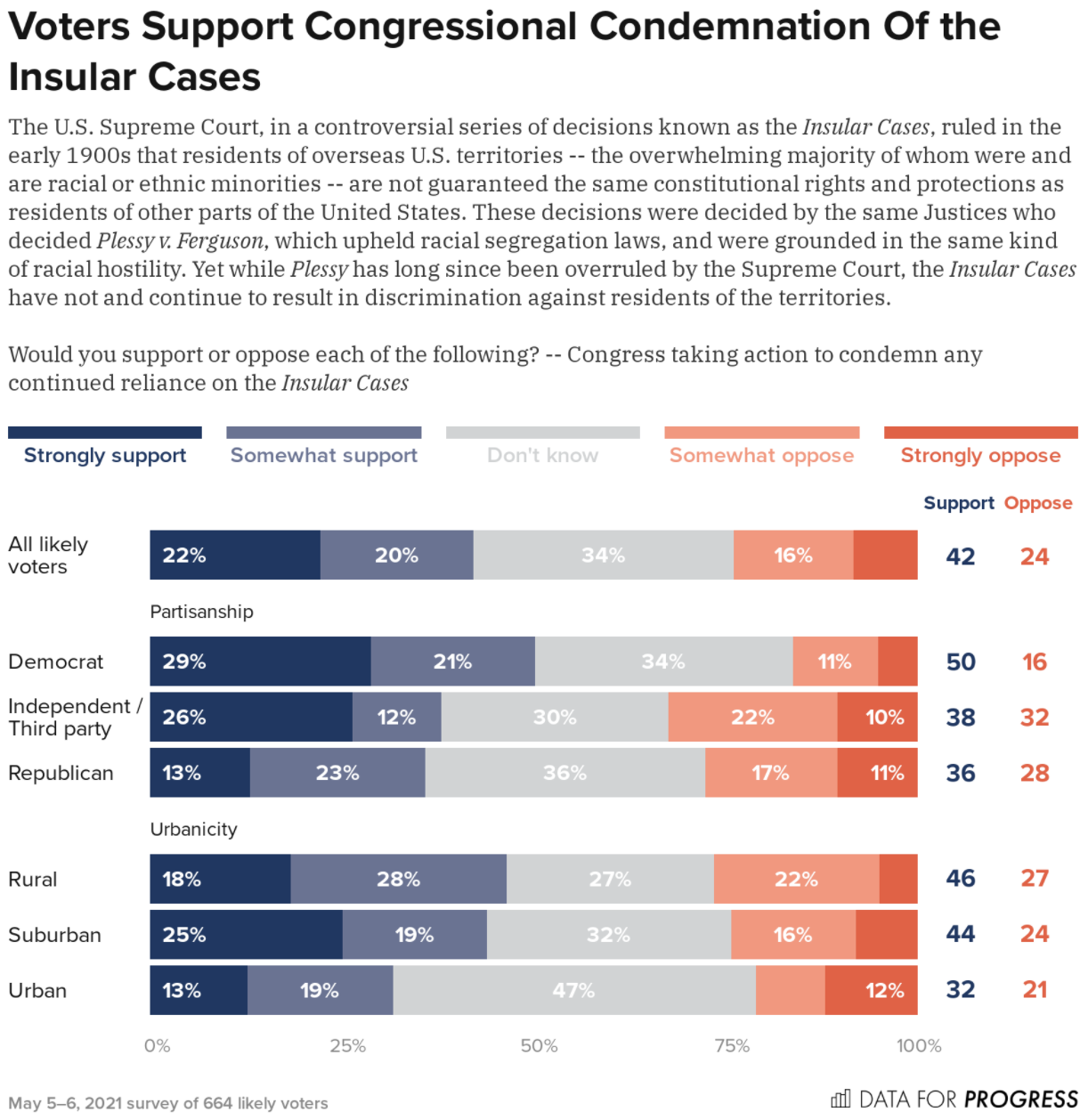

The Supreme Court is seen on Capitol Hill in Washington, Monday, June 29, 2020. (AP Photo/Patrick Semansky)
A new poll released by Data For Progress on Wednesday concluded that 47% of likely voters would support overruling the Supreme Court’s racist Insular Cases rulings of the early 1900’s, although a significant number (32%) don’t even have a position, suggesting that more education about these rulings needs to continue. Essentially, the Insular Cases are the U.S. legal framework that justify a colonial relationship with territories like Puerto Rico American Samoa, the Commonwealth of the Northern Mariana Islands, Guam and the Virgin Islands.
The poll had two questions, one that asked about overruling the Insular Cases and one that asked about condemning the cases.
The full breakdown of the overruling question is here:


The full breakdown of the overruling question is below. In that question, 42% of likely voters support condemning the case. Stronger support increases with Democratic voters.


On Wednesday afternoon, the House Committee on Natural Resources will be holding a hearing about H.Res.279, which reads as follows:
RESOLUTION
Acknowledging that the United States Supreme Court’s decisions in the Insular Cases and the “territorial incorporation doctrine” are contrary to the text and history of the United States.
Constitution, rest on racial views and stereotypes from the era of Plessy v. Ferguson that have long been rejected, are contrary to our Nation’s most basic constitutional and democratic principles, and should be rejected as having no place in United States constitutional law.
- Whereas territories have been an important part of the United States since the beginning of our Nation, starting with the Northwest Territory in 1787, with Chief Justice John Marshall writing for the Supreme Court in 1820 that “the United States” is “the name given to our great republic, which is composed of States and territories” (Loughborough v. Blake, 18 U.S. (5 Wheat.) 317, 319 (1820));
- Whereas today the United States has 5 populated territories, American Samoa, the Commonwealth of the Northern Mariana Islands, Guam, Puerto Rico, and the Virgin Islands of the United States, which together have a population of over 3,500,000 residents, equal to the population of the 5 smallest States combined, more than 95 percent of whom are racial or ethnic minorities;
- Whereas Puerto Rico and Guam have now been a part of the United States since 1898, American Samoa since 1900, the Virgin Islands of the United States since 1917, and the Commonwealth of the Northern Mariana Islands since 1986;
- Whereas until the Insular Cases were decided in the early 1900s, the Supreme Court long recognized that Congress’ powers over the territories, while broad, were “not absolute and unlimited”, but rather subject “to such restrictions as are expressed in the Constitution” (Murphy v. Ramsey, 114 U.S. 15, 44 (1885);
- Whereas following the acquisition of Hawaii, Puerto Rico, Guam, and other overseas territories in 1898, the Supreme Court’s decisions in the Insular Cases broke from its prior precedent to establish a doctrine of territorial incorporation, creating for the first time a distinction between so-called “incorporated” territories, where the United States Constitution applies “in full”, and “unincorporated” territories, where the Constitution applies “only in part” (Boumediene v. Bush, 553 U.S. 723, 757 (2008));
- Whereas the judgment of the Court in Downes v. Bidwell (182 U.S. 244 (1901)), the most prominent of the Insular Cases, was delivered by Justice Henry Billings Brown, the author of Plessy v. Ferguson’s doctrine of “separate but equal”, who wrote that America’s newly acquired overseas territories were “inhabited by alien races, differing from us in religion, customs, … and modes of thought”, making it impossible to govern “according to Anglo-Saxon principles”;
Whereas Justice Edward White, who in a separate 3-Justice plurality developed the territorial incorporation doctrine in Downes, expressed concerns over the “evils” of admitting “millions of inhabitants” of “unknown islands, peopled with an uncivilized race”, who he believed would be “absolutely unfit” for citizenship; - Whereas 4 Justices dissented in Downes, with Chief Justice Melville Fuller commenting that “[g]reat stress is thrown upon the word ‘incorporation,’ as if possessed of some occult meaning”, and Justice John Marshall Harlan expressing that the “idea of ‘incorporation’ . . . is enveloped in some mystery which I am unable to unravel”;
- Whereas Justice Harlan, who penned the lone dissent to Plessy v. Ferguson, also wrote a series of powerful dissents to the Insular Cases, declaring in Downes that “[t]he idea that this country may acquire territories anywhere upon the earth, by conquest or treaty, and hold them as mere colonies or provinces—the people inhabiting them to enjoy only such rights as Congress chooses to accord to them—is wholly inconsistent with the spirit and genius, as well as with the words, of the Constitution”;
- Whereas the Insular Cases and the territorial incorporation doctrine have long received significant criticism from the Supreme Court and a broad range of jurists and legal scholars;
- Whereas, in 2008, the Supreme Court stated that “[t]he Constitution grants Congress and the President the power to acquire, dispose of, and govern territory, not the power to decide when and where its terms apply”, expressing further that “over time the ties between the United States and any of its unincorporated Territories [may] strengthen in ways that are of constitutional significance” (Boumediene v. Bush, 553 U.S. at 758, 765 (2008));
- Whereas, in 2020, the Supreme Court questioned the “continued validity” of the Insular Cases, indicating “that the Insular Cases should not be further extended” (Fin. Oversight & Mgmt. Bd. for P.R. v. Aurelius Inv., 140 S.Ct. 1649, 1665 (2020));
- Whereas Judge Juan Torruella, who served on the United States Court of Appeals for the First Circuit from 1984 until his death in 2020, labeled the territorial incorporation doctrine a “doctrine of separate and unequal”, writing that “the Insular Cases represent classic Plessy v. Ferguson legal doctrine and thought that should be eradicated from present-day constitutional reasoning” because they run contrary to “the most basic precept for which this nation stands: the equality before the law of all its citizens”;
- Whereas Chief Judge Gustavo Gelpí, who has served on the United States District Court for the District of Puerto Rico since 2006, has called the Insular Cases’ territorial incorporation doctrine “a doctrine of pure judicial invention, with absolutely no basis in the Constitution and one that is contrary to all judicial precedent and territorial practice”;
- Whereas legal scholars with a wide range of views have criticized the Insular Cases and the territorial incorporation doctrine, with prominent originalist legal scholar Gary Lawson writing that “there is nothing in the Constitution that even intimates that express constitutional limitations on national power apply differently to different territories”, and leading Constitutional Law Professor Sanford Levinson calling the Insular Cases “central documents in the history of American racism”;
- Whereas the territorial incorporation doctrine established by the Insular Cases is still used to perpetuate the second-class treatment of Americans living in the territories, from the denial of citizenship, to the denial of voting rights, to the denial of equality in Federal benefits programs; and
- Whereas the time has come to expressly reject the Insular Cases as both contrary to the Constitution’s text and history and as incompatible with our Nation’s core values: Now, therefore, be it
Resolved, That the House of Representatives—
(1) recognizes that America’s constitutional and democratic principles apply throughout the United States, including both States and territories;
(2) acknowledges that the Insular Cases are contrary to the text and history of the Constitution;
(3) acknowledges that the Insular Cases are relics of the racial views of an earlier era that have no place in our Nation today; and
(4) rejects the Insular Cases and their application to all present and future cases and controversies involving the application of the Constitution in United States territories.



Every American lawyer and politician that believes in equal rights for all U.S. citizens regardless of race, ethnicity and place of residence (i.e. residence in the U.S. territories as opposed to the States of the Union and the District of Columbia) understands that the SCOTUS rationale and language in the Insular Cases are relics of a bygone era when racial discrimination was an acceptable and even a protected principle of American jurisprudence; the inevitable conclusion is that it’s high time to consign that shameful case law IN ITS ENTIRETY to the legal, historical and constitutional garbage heap, just like the underlying principles that were justified and upheld in the Insular Cases were discarded and ruled to be unconstitutional long ago in many SUBSEQUENT opinions of the U.S. Supreme Court. In that sense, the Insular Cases have already been revoked “sub silentio”. HOWEVER, to the extent that legitimate doubts persist about the Insular Cases’ current validity, any and every effort to SPECIFICALLY AND EXPRESSLY condemn and revoke those cases is not only welcome but necessary. What no legal scholar seems to have noticed –with the possible exception of the Hon. Gustavo A. Gelpí, Chief Judge of the U.S. District Court for the District of Puerto Rico– is that, even by the racist and prejudiced language of the Insular Cases, the mere passage of 100+ years has rendered all remaining U.S. territories as “de facto” INCORPORATED territories of the United States, hence INTEGRAL PARTS of the United States earmarked for statehood. It’s HIGH TIME that ALL Americans finally realize that U.S. is composed of 56 and NOT 50 jurisdictions: the 50 States of the Union, the District of Columbia and the 5 inhabited U.S. territories of American Samoa, Guam, the Northern Mariana Islands, Puerto Rico and the U.S. Virgin Islands.